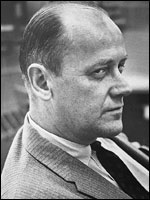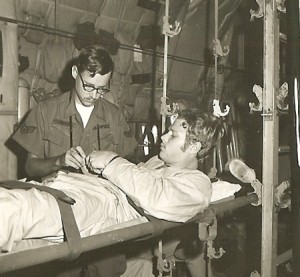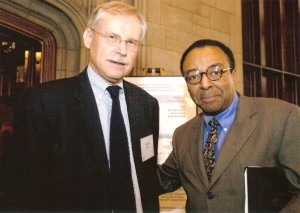Richard Liefer
Associate National News Editor, Editorial Writer, Op-Ed Editor at Chicago Tribune
Degree(s): BJ '68 (News Editorial)
Whereabouts: United States, Chicago, Illinois
Learning the Nuts and Bolts
Fresh off a 140-acre family farm in Red Bud, Ill., Richard Liefer arrived at Mizzou on a wave of baby boomers in 1964. Freshman enrollment soared, and campus dorms were so full, he was crowded into a two-person room with two other roommates.

Mizzou was bigger and busier than his hometown. “I was the proverbial little fish in a big pond,” Liefer says. He adjusted quickly, however, and enjoyed following his liberal arts and science courses.
Liefer always loved reading and writing. He recalls home delivery of the St. Louis Globe-Democrat in the mornings as a child, and devouring the Post-Dispatch on Sundays with his family. Studying journalism seemed like a good plan.
Accepted to the J-School his junior year at Mizzou, Liefer took the quintessential Principles of American Journalism class under William H. Taft, and recounts how the grandfatherly Eugene Sharp moved around the Missourian newsroom, offering guidance to students.
He best remembers one of his favorite professors, G. Thomas Duffy, called “Duffy” by faculty and students alike, as a wise, weathered newspaperman with little formal education. Duffy taught features on deadline, giving Liefer some of the most useful training in his time at Mizzou.
Duffy shared a memorable anecdote with his students, second-hand advice that has stayed with Liefer ever since. Once, when covering an execution, Duffy was overwhelmed by the gravity of the story. Dissatisfied with Duffy’s flowery lead, his editor told him, “Just play it straight. Just play it straight and factual, like any other story.”
Senior Year
The year 1968, Liefer’s last at Mizzou, was a stressful time for a young man to face the world. In January, the Viet Cong launched the Tet Offensive in Vietnam; civil rights leader Martin Luther King Jr. was assassinated on an April day in Memphis; and just as Liefer was graduating in early June, New York Sen. Robert F. Kennedy was shot and killed during his campaign for presidency.
U.S. draft policy at the time was based on age, with men in the 19 to 25 bracket eligible for service. Those enrolled in school received a deferment, but as graduation approached, Liefer knew he would be eligible. Conflict in Vietnam made the draft a prime topic of discussion nationwide.

It was sure to come up in job interviews and talks with recruiters at the J-School. “It’s what everyone was talking about,” he says. “We were all trying to figure out what to do about the draft.”
Finding a job after graduation was difficult because of the war. Employers were reluctant to hire men who might soon be called away. Instead, Liefer enlisted in the Air Force that summer. Following six weeks of basic training, his Mizzou-taught journalism skills earned him a spot as an information specialist in Washington, D.C.
Saigon to a Kansas City Laundromat
Liefer was sent to Vietnam in November 1969, where he sparked a lifelong interest in Asian affairs. “There was a war going on, and maybe it seemed like a big mistake,” Liefer says. “But it was exciting to be there.” Liefer witnessed a freewheeling, quickly changing situation in the country, as many military units were withdrawn as part of Richard Nixon’s “Vietnamization” program.
He was a public relations Air Force writer there for nine months before becoming a reporter for the Pacific Stars & Stripes bureau in Saigon, a government-sponsored newspaper for military personnel. Treated like a civilian journalist, Liefer traveled frequently around Vietnam, covering stories about the troops, Air Force pilots and civilians.

Finished with his military service in 1971, Liefer took a job for a small fresh produce trade publication in the Kansas City area. “They needed a warm body in a hurry,” he says. Liefer reported nationwide fruit and veggie stats and trends, along with two other Mizzou alums, one a recent graduate, the other a veteran editor and onetime Kansas City Star reporter. The three J-School alums tolerated the fourth full-time staffer, a lone KU graduate.
It was around this time that Liefer, still single, had a fateful conversation with an old friend and fellow J-School graduate from the Air Force. “He said, ‘You know a good place to pick up women? The laundromat.'” Not long after, Liefer met his future wife, an artist named Linda, at the laundromat.
“She was the most attractive person there,” says Liefer, who also noticed she was the only person reading a literary book – a novel by Kurt Vonnegut. “She proved irresistible.” They were married soon after.
Liefer, ready for a more news-oriented job, moved to Iowa, where he was on the editorial page staff for five and a half years with the Des Moines Register & Tribune. He then won a yearlong Asian affairs fellowship for journalists at the University of Hawaii. His family, which now included a daughter, Allison, accompanied him there. He headed back to the Midwest as a news copyeditor for the Milwaukee Sentinel, but before long, Liefer began his long career at the Chicago Tribune.
Big City News
In 1980, the Chicago Tribune was an expanding news force looking to hire. Liefer had friends on the Tribune staff, and was not the first editor to move there from the Sentinel. In fact, the office joked that there was a trapdoor under the Milwaukee newsroom leading directly to Chicago.
Liefer started at the copy desk. He was impressed by Chicago’s big city news environment and the Tribune’s modern, top-ranked reputation. “It was serious stuff,” says Liefer, who enjoyed the fast-paced challenge.
By the time he retired in 2007, after 27 years with the Tribune, Liefer had served as op-ed editor, an editorial writer and an associate national news editor.
His favorite role was that of op-ed page editor from 1984-90. “It put me in contact with so many people,” he says. “I knew more people outside the newsroom than in it.”
For Liefer, the op-ed page was a forum for ideas, and it felt good to play a role in public affairs. “I’m proud to say I even got fan mail from people whose articles I edited,” he says, recalling in particular a medical ethicist who complimented his ability to “get inside the author’s own mind.”
Liefer moved to editorial writing in the early 1990s, and served as associate national news editor from the mid-90s on. He worked with correspondents, other editors and wire services on deadline to cover important national news topics like the Oklahoma City bombing, numerous presidential races, 9/11 and Hurricane Katrina. His personal favorite pieces include editorials about the troubled political atmosphere in Haiti in the 1990s. Liefer traveled there twice, witnessing Haiti’s poverty first-hand.
“Some of the most satisfying days were those I’d write an editorial I knew was just right in tone and content,” he says. “And as an editor it was satisfying to publish an article from someone with a great cause or need.”
What Liefer really remembers about the Tribune is the sense of teamwork with his colleagues. “I was lucky to work for and with a lot of good people,” he says. “The satisfaction came from putting out pages of great stories side-by-side with some of the best journalists in the nation.”

Toasting the Journalism Enterprise
Liefer and his wife now live in Oak Park, Ill., a suburb of Chicago. He still uses his writing and editing skills working as a volunteer mentor to high school writing students in a program run by Open Books, a Chicago organization that promotes literacy.
The Liefer farm near Red Bud, a six-hour drive from Chicago, remains in family hands. Liefer, a part owner, enjoys regular trips to visit and work in the farm’s 25 acres of woods. The farm produces corn, soybean and wheat crops.
The Liefers attended the J-School’s centennial celebration in September 2008. Liefer was pleased to be reunited with familiar faces. The seemingly ageless Professor William H. Taft gave a moving speech at Liefer’s 40-year class reunion, and for the first time, Liefer introduced his wife to the old Air Force and fellow J-School graduate whose laundromat suggestion had led to such success.
Although generally pleased with the ethical standards and education of today’s journalists, Liefer expresses disappointment with the newspaper industry’s current trials amidst economic crisis and shifts in news culture. Papers across the nation are folding or cutting back, the Chicago Tribune included.
“The size of the paper has shrunk drastically,” he says, “and the news content is often too meager.”
Liefer acknowledges the future is in online news, but he regrets that newspaper leaders and managers were initially complacent when faced with competition from the Internet and other new media. “They failed to see the need for creative adaptation while there was still time to adapt,” he explains.
Still, Liefer hopes that future generations of journalists will overcome these troubles. The key to recovery, in Liefer’s opinion, involves a bit of technological evolution, but he believes modern journalists also need backbone and good sense, cornerstones of the newspaper industry’s lively past.
Though things are changing, Liefer enjoys old newspaper lore. “There were so many colorful people,” he says. “Newspapers have always been magnets for off-beat, unorthodox and nonconformist folks.”
He fondly describes one memorable character, for example, a chain-smoking veteran editor full of aged Tribune anecdotes, who sometimes complained of waking in the morning with his cat’s foot in his mouth.
“It never was boring.”
Updated: November 9, 2011